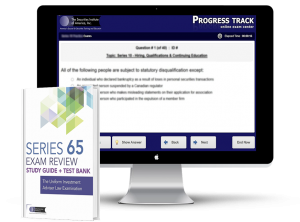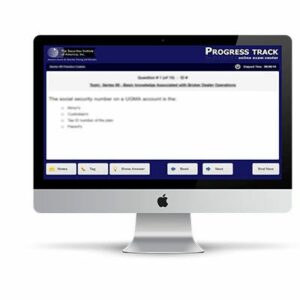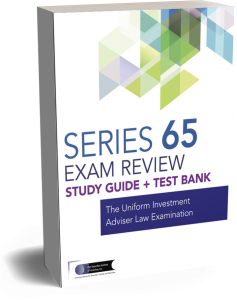
This series 65 study package is by far our most popular. Is proven to produce the highest pass rates and rated the best study material
$209.00

$ 209.00

$ 139.95

$ 124.99
Passing the Series 65 exam qualifies investment professionals to represent a registered investment adviser. Acting in the capacity of an investment adviser representative. This allows individuals to earn fees for providing investment advice. Fess are traditionally charged as a percentage of assets under management.
No. The North American Securities Administrators Association does not require candidates to be sponsored. Candidates may submit form U10 to open an exam window.
The test questions presented on the exam focus on the following topics. Client Investment Recommendations and Strategies. Portfolio Management, Registration Requirements and the authority of the State Securities Administrators.
The Series 65 exam contains 130- Multiple choice questions. Each question requires candidates to select from the 4 available answer choices. The exam will also have 10 questions which will not count toward the final score. These are not scored questions and are mixed in during the course of the exam.
The series 65 examination must be completed within the 3 hour time limit.
The passing score for the series 65 is 70%.
No. The exam is not graded on a curve. 91 of the 130 score questions must be answered correctly.
The exam fee is $187.
Candidates must appear at an approved Prometric test center. Prometric has centers available throughout the world. The test may be scheduled any day the center is open.
A comprehensive approach to preparing for the exam is a must. Students should read the textbook completely. Our preparation is set up so that every chapter in the textbook has a corresponding video lesson. Providing more detail and information on the topics contained in the reading. The best practices for preparing for the series 65 exam are: 1) read the chapter. 2) take the quiz at the end of each chapter. 3) watch the corresponding video training module. 4) take the quiz at the end of the video class presentation. Follow this format throughout the entire book and video presentation. Take topic focused practice questions. Once your reading and series 65 videos are complete, move on to the series 65 simulated final exams. Pay attention to the explanations and rationales. This is particularly important on the checkpoint and greenlight exams.



Series 65 Exam Prep Study Materials





Series 65 Important Concepts
A stock’s alpha is its projected independent rate of change or the difference between an investment’s expected return and its actual return. Portfolio managers whose portfolios have positive alphas are adding value and increasing the return through their asset selection.
A stock’s beta is its projected rate of change relative to the market as a whole. If the market was up 10% for the year, a stock with a beta of 1.5 could reasonably be expected to be up 15%. A stock with a beta greater than one has a higher level of volatility than the market as a whole and is considered to be more risky than the overall market. A stock with a beta of less than one is less volatile than prices in the overall market and is considered to be less risky. An example of a low beta
Read moreIn a normal interest rate environment, longer-term bonds will pay investors a higher interest rate than short-term bonds of equal quality. As interest rates change the price of existing bonds will move inversely to the change in interest rates. A bond’s duration is a measure of the bond’s price sensitivity to a small change in interest rates and is stated in years. Longer term bonds and bonds with low coupons will generally have a higher duration than shorter term or higher yielding bonds. The higher the bond’s duration, the greater the bond’s interest rate risk and the greater its price volatility. Duration allows investors to compare the interest rate risk associated with bonds of different maturities, quality, and coupons. The bond’s duration may be stated as either modified duration or effective duration. Modified duration assumes
Read moreEconomics, put simply, is the study of shortages – supply vs. demand. As the demand for a product or service rises, the price of those goods or services will tend to rise. Alternatively, if the provider of those goods or services tries to flood the market with those goods or services, the price will tend to decline as the supply outpaces the demand. The supply and demand model works for all goods and services including stocks, bonds, real estate, and money. Series 65 candidates can expect to see 10 to 15 questions on economics.
Read moreIt is unlawful for an investment adviser to conduct securities business without being duly registered or exempt from registration. State registration exemptions are provided for investment advisers who:
2025 © Securities Institute, All Rights Reserved.
Privacy Policy | Terms of Service.